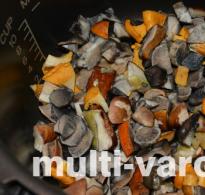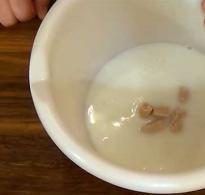Is chewing coffee beans beneficial or harmful? Coffee beans covered in chocolate are an unusual sweetness and a great gift.
Most coffee lovers value three properties in it - the divine aroma, the unique taste and the desired cheerfulness that it gives. But there is much more to the coffee bean than it seems, and many of its properties have been scientifically proven.
Properties of beans and ground coffee
The most significant beneficial properties of coffee are due to the content of some special components in it. First of all, it is caffeine, an alkaloid that actively affects the human nervous system. The process of its transformations in the body is quite complex and multi-stage, but in a few words it can be explained as follows:
- entering the stomach and undergoing some transformations, it enters the intestines;
- from the intestine it is absorbed into the blood and enters the brain;
- in the brain it blocks inhibitory receptors;
- in connection with this, activation of other receptors responsible for activity occurs;
- As a result, a person feels a surge of strength, a decrease in the degree of fatigue, increased efficiency, and a lift in mood.
The hormone of happiness contained in coffee, serotonin, is also responsible for a positive attitude. If you drink the drink regularly, 2 cups a day, the risk of developing depression is reduced. Special studies have been conducted to evaluate the effect of coffee on a person’s psychological state. They showed that those who drank coffee regularly were at much lower risk of suicide and the development of serious mental disorders than those who did not drink the drink at all.
The more the grain is roasted, the less nutrients it contains.
It contains calcium, phosphorus, sulfur, sodium, iron, and potassium. It contains 30 organic acids, vitamins B and PP. That is why the drink is considered an assistant to the digestive system, participating in the processes of food digestion and stimulating the production of digestive juice. Coffee is also useful for those who want to lose weight, as it speeds up metabolism, reduces appetite and contains a minimum of calories per serving.
Natural ground coffee improves brain function by stimulating blood circulation in it and increasing the speed of nervous processes. Due to this, memory and mental performance improves. To give your nervous system a full rest, you should not drink any coffee drink before bed.
The benefits of natural coffee are much higher than those of tea, although the alkaloid content in the latter is much higher. This is due to the way the body processes caffeine from the grain and from the leaf. In the latter case, it is absorbed more slowly and not completely.
Coffee is a way to cope with the loss of energy caused by low blood pressure. It is really effective for hypotension, migraines, frequent headaches, fatigue and drowsiness. The substance trigonelline has a positive effect on blood vessels, dilating them and relieving spasms. Blood circulation accelerates, causing blood pressure to rise by several units, which is often enough for normal well-being.
Recent research by scientists has shown that coffee is a natural antihistamine that fights many microorganisms that cause allergic reactions, thereby slowing down the development of an allergic reaction.
The grain contains antioxidants and flavonoids, which are the main substances that fight cell aging. It is not for nothing that many cosmetic products contain extracts of natural coffee, which help maintain skin elasticity, stimulate hair growth on the head and improve the condition of the skin in general.
There is evidence that regular coffee consumption reduces the risk of developing diseases such as:
- breast cancer;
- Parkinson's disease;
- Alzheimer's disease;
- cirrhosis.
The drink is beneficial for men and women. For some it is a means of improving potency, for others it is a means of enhancing libido.
Benefits of green coffee
Green grains are considered the most valuable in terms of health benefits for humans. If some of the beneficial substances are lost when roasting coffee beans under the influence of high temperatures, then in the unprocessed product their concentration is much higher. This applies to caffeine, chlorogenic acid, calcium and magnesium, phosphorus, sulfur, some organic acids and oils.

Unroasted grains are a rich source of biologically active component - chlorogenic acid
A drink made from green grains is less aromatic and tasty, but is more beneficial for metabolism. Chlorogenic acid, present in large quantities in grains, stimulates metabolic processes and the production of gastric juice, participates in the breakdown of fats and proteins, helping the body to fully digest food and preventing the deposition of fats.
This property of green grains has been adopted by nutritionists and those who want to lose excess weight without resorting to pills and surgery. Calcium, also present in large quantities in coffee, helps strengthen bone tissue and the walls of blood vessels and capillaries.
Is instant coffee healthy?
There is instant coffee and its variety – freeze-dried. The latter contains more useful substances due to the nature of production. In general, a natural product is much more valuable than a soluble one, but the latter also has benefits:
- Contains a lot of caffeine, so it invigorates and improves vitality.
- Helps normalize stomach acidity, which is important for those who are prone to low acidity.
- It lifts your mood as it contains serotonin.
- It has a diuretic effect and removes excess fluid.

The freeze-dried product has more benefits than the regular instant product.
The main components of instant coffee are caffeine and some organic acids; there are almost no vitamins, micro- and macroelements in it. That is why such a product can only act as a stimulant and stimulate some digestive processes.
Harm from coffee
Those who love coffee need to know that an overdose of it leads to insomnia, overexcitation, and headaches. Therefore, drinking the drink should be stopped at the third cup a day.
The drink is contraindicated for people suffering from the following diseases:
- glaucoma;
- hypertension;
- coronary heart disease;
- atherosclerosis;
- kidney pathologies;
- stomach ulcer.

Only excessive consumption of coffee can seriously harm your health.
The beneficial and harmful properties of coffee go side by side. So, if you have gastritis, the drink is contraindicated, but if you have digestive problems, on the contrary, it is useful. It is not recommended to drink coffee for those who suffer from increased excitability, sleep poorly, are under stress, or use diuretics. Coffee has the property of removing fluid from the body, as a result of which the metabolism of calcium and other microelements can be disrupted. It is not recommended to drink the drink for children under 12 years of age, pregnant and lactating women.
Coffee is a rather healthy product, and the harm from drinking it can be minimized by sticking to a moderate dosage or drinking a decaffeinated drink. The golden mean comes in handy here. With two small cups of natural coffee, you can end your relationship with this drink today and resume it tomorrow!
A large number of people cannot imagine their morning without a fragrant cup of coffee; this tonic drink invigorates and energizes. There are many studies and opinions about coffee, the benefits and harms for the human body. Which of them are correct and is there a danger of harming your health by drinking the drink every day?
Composition of coffee beans
Coffee is made from roasted beans of the coffee tree. There are more than 90 varieties of such plants in nature. Of the industrial varieties, Arabica and Robusta are most often used.
Coffee beans contain more than one thousand different components, 800 of them are aromatic substances that give the drink a unique smell. Grains contain:
- Carbohydrates provide the body with energy and contribute to the accumulation of nutrient reserves.
- Tannins (tannins) have astringent properties, have antimicrobial, hemostatic properties, and remove toxins in case of poisoning.
- Organic acids: malic, acetic, citric, oxalic, pyruvic acids take part in the metabolic processes of the body.
- Alkaloids: caffeine, theophylline, theobromine affect the nervous system, increase body tone, performance, and concentration. Regulates the level of glucose in the blood.
- Nicotinic acid is involved in the formation of digestive enzymes, lipid metabolism, and redox processes in the body.
- Chlorogenic acid has a pronounced antioxidant effect, has antiviral, hepatoprotective (protects liver tissue), and antitumor properties.
- Macro and microelements: calcium, iron, fluorine, sodium, magnesium, phosphorus, sulfur are involved in biochemical processes.
Is drinking coffee harmful? Spanish scientists have found that the peel of coffee beans contains a large amount of antioxidants (tannins), which are much stronger than vitamin C or green tea. These substances help remove toxins from the body. In addition, the shell contains plant fiber and phenols, which stimulate the gastrointestinal tract.
During roasting, the water content in beans decreases by 3 times. The calorie content of 1 cup of tonic drink is only 9 kcal, but if you add a little milk or dilute it with cream, the energy value of the product increases to 40–60 kcal.
Useful properties

What are the benefits of coffee for the body?
- It has diuretic properties, therefore preventing the formation of kidney stones.
- The benefits of coffee are used to prevent constipation. The plant fiber contained in grains helps with this. Caffeine increases the acidity of gastric juice and stimulates increased liver function and bile production.
- Caffeine stimulates the nervous system, increasing efficiency, tones the body and eliminates drowsiness and headaches. The effect lasts 3–4 hours.
- The benefit of coffee for the respiratory system during bronchitis and pneumonia is the removal of phlegm, due to the content of tannins. In combination with lemon and honey, it strengthens the immune system, suppresses viruses, and enhances the antioxidant effect.
- A sugar-free drink is beneficial for the female body when losing weight. It promotes fat burning during exercise due to the increased tone and performance caused by caffeine.
- Coffee is known to be beneficial for hypotension, as it increases blood pressure.
- Due to its antioxidant content, coffee is a cancer preventative in women and men. Antioxidants protect cell structure from the effects of free radicals.
- The drink prevents Parkinson's and Alzheimer's diseases due to stimulation of the central nervous system. Drinking coffee prevents the destruction of brain cells.
- What are the benefits of coffee? Caffeine enhances the effect of medications such as Aspirin and Paracetamol, increasing the load on the liver.
- The drink helps with poisoning due to its antioxidant effect. Helps remove toxins from the body.
- Caffeine, when consumed in moderation (up to 300 ml per day), restores damaged liver cells, preventing cirrhosis.
The benefits of coffee appear only with moderate use of the drink; large doses (more than 300 ml per day) contribute to addiction and intoxication of the body.
Types of instant drink

According to the production method, instant coffee can be powdered, sublimated or granulated. Powder is prepared from roasted and crushed grains, soluble substances are extracted from the resulting mass, cooled, filtered, and dried with hot air.
The production of a granulated drink is identical, only at the end the powder is formed into granules using steam supplied under high pressure.
The freeze-dried product is prepared differently. First, a decoction of coffee beans is made and completely frozen; the resulting mass is dehydrated under low pressure. The product is then crushed into small, irregularly shaped pieces. The freeze-dried variety, unlike other types of instant drinks, preserves the properties and taste of natural grains as much as possible.
The beneficial and harmful properties of coffee in the form of powder or granules are manifested in lower caffeine content, so you can drink 4-5 cups every day. Harmful properties appear in case of overdose: the functioning of the heart, liver, and nervous system is disrupted. Cardiac activity, cerebral vessels, and the central nervous system are affected by increased blood circulation, and liver function is affected by increased acidity of gastric juice.

Freeze-dried coffee retains the same amount of caffeine as natural black coffee. It has the same effect on the body.
To add piquancy and variety to the popular drink, flavored varieties are produced with the taste of caramel, chocolate, vanilla, hazelnut, almond, honey, lemon, and alcoholic beverages. The flavored product in grains has become especially famous.
A refined taste is imparted by spraying flavored substances (essential oils) onto the grains, the inside of the package, and into the ground powder. What are the benefits of a flavored drink? The beneficial properties of coffee are the same as those of natural varieties. You just need to remember that a natural flavored product made from quality grains cannot be cheap.
Coffee addiction
Is coffee harmful to health? When taken correctly, the natural drink does not cause harm, and in some cases is even beneficial. Its systematic consumption of 3 cups every day can cause addiction (theism). A dosage of more than 4 cups can lead to intoxication of the body due to the effect of caffeine on the heart and central nervous system, anxiety, tremors of the limbs, confusion, and a severe headache.
Important! The safe daily dose of caffeine for humans is 300 mg. More than 90 mg of caffeine (1 cup) per 1 kg of body weight, drunk in a short period of time (2-3 hours), can lead to death. The load on the heart increases, blood circulation is impaired and death can occur!
Caffeine tones the nervous system, improves mood, and increases performance. Therefore, it causes psycho-emotional addiction. Without drinking coffee, a dependent person feels irritation, headache, decreased performance, and drowsiness.
Methods for preparing the drink
Freeze-dried coffee with milk: harm or benefit? When preparing the drink, it is not recommended to add sugar to it; it is better to drink it with honey. The benefit of coffee with milk or cream is that caffeine flushes calcium from the body, and milk replenishes this microelement. The drink retains all the harmful and beneficial properties of natural coffee.
When milk is added to a drink, calcium mineral salts accumulate in the kidneys and stones form.
Natural coffee, the benefits and harms of its use for women and men are manifested in an increase in the overall tone of the body. The negative effects of the drink cause disruption of the heart, liver, and nervous system. Blood circulation increases, which increases the load on the organs of the cardiovascular system. Increased stomach acidity after drinking coffee increases the load on the liver.
Flavored coffee beans are ground and brewed in a Turkish coffee pot. There is no need to dilute the drink with cream or milk so as not to spoil the taste of the additives. The freeze-dried or granulated soluble product is brewed with boiling water. You can add 2 tablespoons of milk to reduce bitterness, and honey instead of sugar.
You can add a slice of lemon to any type of coffee, this will give the drink a special taste and aroma. Citrus zest, cloves, and cinnamon are also used. Drinking lemon will help replenish vitamin C, potassium, phosphorus and magnesium, which caffeine removes. Lemon has a beneficial effect on the condition of blood vessels, while neutralizing the effect of caffeine.

Coffee with lemon and honey is also useful in the treatment of colds, since caffeine removes phlegm, and citrus strengthens the immune system, fights viruses, and relieves inflammation. Honey is a powerful antioxidant and reduces the harm from drinking coffee.
To add to a tonic drink, it is best to use linden and buckwheat honeys; they help reduce the bitterness of natural coffee. You need to prepare a drink with honey correctly; the bee product is added to a warm drink (50˚), otherwise all the beneficial properties of honey are lost.
Harmful effects
What harm does coffee cause to the body?

Harm to women's health

How is coffee harmful for pregnant women? The drink dilates blood vessels and can increase blood pressure. This is dangerous for the health of the expectant mother, as involuntary abortion, bleeding or premature birth may occur. A dangerous dosage is more than 2 cups every day. If there are disturbances in the functioning of the heart and vascular system in the expectant mother, children may be born with underweight and anemia.
The harm of coffee for young women is to reduce the possibility of conceiving a child by 40%. This happens because caffeine changes hormonal levels and negatively affects ovulation and contractility of the fallopian tubes.
For pregnant and lactating women, the harm of coffee lies in the negative impact of caffeine on the baby’s nervous system. Due to the diuretic properties, calcium is washed out, the child’s baby teeth will quickly deteriorate, and the mother will lose her permanent ones.
Important! With frequent coffee consumption, women need to replenish fluid loss in the body. You should drink at least 2 liters per day of pure still water every day.
Systematic use of a soluble freeze-dried product without constant physical activity leads to the formation of cellulite in women on the thighs and abdomen. The drink disrupts blood flow and contributes to impaired water metabolism, and these are the main reasons for the formation of “orange peel.”
Harm to men's health

What is the harm of coffee for men? When drinking a flavored drink, the level of testosterone in the blood of representatives of the stronger sex decreases. Microelements necessary for the functioning of the prostate gland (magnesium, zinc, vitamins A, E) are excreted in the urine, and sexual desire decreases.
Caffeine stimulates the production of the stress hormone and the release of adrenaline into the blood. The male body perceives this as a decrease in the need for testosterone.
The harm of coffee to the male body lies in the risk of developing enuresis (urinary incontinence). American scientists have found that drinking 3 cups of natural drink per day increases the likelihood of developing urinary incontinence by 70%.
When not to drink coffee
Main contraindications:
- Hypertension. Caffeine increases blood pressure and can lead to a hypertensive crisis. In people who constantly drink coffee, blood pressure does not increase due to addiction.
- For insomnia. The drink further tones and invigorates the human body.
- The harm of coffee manifests itself in gastritis, peptic ulcers of the stomach and duodenum. Chlorogenic acid causes irritation of the mucous membranes, heartburn and exacerbation of diseases of the digestive tract. It is especially harmful to drink a flavored drink in the morning on an empty stomach.
- In polycystic ovary syndrome, caffeine helps accelerate the growth of cysts. This is a hormonal disease, and coffee can disrupt the normal balance of hormones in a woman’s body.
- Pregnancy and breastfeeding are the main contraindications due to the risk of premature birth and harm to the health of the fetus.
- Atherosclerosis is one of the contraindications, since caffeine increases blood cholesterol levels. This substance is affected by coffeestol, contained in grains. It affects the receptors of intestinal cells that transport bile acids from the liver.
- Coffee is contraindicated for osteoporosis (decreased bone density, increased bone fragility) in older people, especially women, since the drink leaches calcium, phosphorus and magnesium, which are necessary for strengthening bones.
- For diseases of the nervous system, since caffeine increases the excitability of the brain.
- Heart pathologies: tachycardia, arrhythmia. The drink dilates blood vessels and disrupts heart rhythm.
- Children and teenagers should not drink this tonic drink, as coffee removes calcium, which the child’s body needs for normal growth.
In case of overdose, the harm of coffee manifests itself in the occurrence of insomnia, nausea, vomiting, and dizziness. The central nervous system is excited, and tremors of the limbs, confusion, and migraine may appear. The heartbeat increases, the rhythm of its work is disrupted, and blood pressure rises.
Is coffee good for human health? When used correctly and without contraindications, a flavored, black or freeze-dried drink will give you vigor, improve performance and mood. And adding lemon and honey will help reduce the negative effects of caffeine.
Some symptoms of appearance:
- increased sweating;
- weakened immunity, frequent colds;
- weakness, fatigue;
- nervous state, depression;
- headaches and migraines;
- alternating diarrhea and constipation;
- I want sweet and sour;
- bad breath;
- frequent feeling of hunger;
- problems with losing weight;
- decreased appetite;
- night grinding of teeth, drooling;
- pain in the abdomen, joints, muscles;
- cough does not go away;
- acne on the skin.
If you have any of the symptoms or doubt the causes of your ailments, you need to cleanse your body as quickly as possible. How to do it.
If you find an error, please highlight a piece of text and click Ctrl+Enter.
Chocolate-coated coffee beans can be found in confectionery shops and departments that sell elite coffee and high-quality tea. Many people are wary of compact boxes containing unusual delicacies, simply having no idea what this product is or how to use it. But those who have already discovered this delicacy often become its regular consumers. This pill successfully replaces many other products, useful and not so useful. A pack of glazed coffee beans eliminates the need to periodically drink instant coffee and freshen your breath with chewing gum. In addition, this bitter sweetness greatly improves your mood and relieves fatigue.
Invigorating effect
The tonic effect of coffee is no secret. Even a small cup of this drink in the morning will drive away the remnants of sleep and help you get involved in the work process. But some peoples, who learned to collect it in time immemorial, do not brew any drinks from it at all, but simply chew the roasted grains.

If you are feeling tired, stressed, or experiencing seasonal depression, chocolate covered coffee beans can be very helpful for you. How to use this product? Just put one little thing in your mouth and then chew or suck - whichever you prefer. When you first get acquainted with this product, you will probably be surprised by one small piece of candy. It will be enough to cheer you up, and for those who are used to eating sweets, coffee in chocolate can be an excellent choice because its rich taste drowns out the feeling of hunger. These pills have an amazing effect. You are unlikely to want to eat more than three or four pieces in a day.
Product Features
Chocolate covered coffee beans are prepared using the same principle. If you are afraid that you simply won’t be able to bite through the candy, then your fears are in vain. The grains undergo preliminary heat treatment. The temperature is not as high as when frying. This makes the grains brittle. You can easily bite through the jelly beans. By the way, the candies have a wonderful crunch.
Sweets manufacturers offer different versions of such sweets. You can choose any type of chocolate covered coffee bean. The most common is regular dark, but there are dragees with white, milk and black (with maximum cocoa content).
Health effects
If you eat a lot of chocolate, you can ruin your teeth and gain a couple of unplanned kilos. If you drink a lot of coffee, problems with the heart, blood vessels and even the central nervous system are inevitable. Therefore, the main question that concerns all lovers of eating coffee beans in chocolate is the benefits and harms of this product. Is the treat dangerous for health?

Here it is worth remembering that everything is good in moderation. And it’s simply impossible to eat too many of these pills. They have a long aftertaste, and the invigorating effect is felt immediately. Of course, if you decide to gobble up the whole pack at once, it will not bring anything good. But you are unlikely to succeed.
Unusual gift
Chocolate-covered coffee beans are usually produced in small, beautiful packages. They can be a wonderful gift for someone you always want to see joyful and full of energy. If you are looking for an unusual, non-binding gift, be sure to pay attention to this delicacy.
In beans? The short answer is yes! People were eating coffee beans as a tonic long before the art of roasting was discovered.
Is it safe to eat raw coffee beans nowadays? Yes, although not everyone will like the taste of the beans. Raw or green, coffee beans are highly acidic and are said to have a "grassy" or "woody" aroma. They are much tougher than refried beans, making them difficult to chew.
If you brew coffee from unroasted beans, you will most likely be disappointed by the unpleasant taste of the drink. This drink does not contain the caramelized aromas that appear during roasting and are associated with the taste of coffee.
Catechins and antioxidants
Along with caffeine, coffee beans contain catechins. These organic compounds are known to increase
the amount of acid in the stomach. Increased stomach acid can cause heartburn and many other problems.
health related.
However, coffee beans contain large amounts of antioxidants, more than those found in traditional coffee. Coffee is Russia's No. 1 source of antioxidants. Antioxidants are linked to cardiovascular, immune and cognitive health, as well as cancer prevention, so generally, the more antioxidants you have in your diet, the better. , unfortunately, destroys a large number of antioxidants.
According to Dr. Daniel Perlman of Brandeis University, dark roasted coffees "leave almost no antioxidants." However, due to their rather unpleasant taste and hardness, unroasted coffee beans are unlikely to become a favorite food anytime soon.
In addition, when transporting raw beans, they may become moldy.
The coffee company Perlman approached the problem in an original way by creating baked coffee flour. Grinded at very low temperatures to prevent oxidation, this flour, made from unroasted coffee beans, is not much like the coffee drink we all know and love. Gluten-free flour can be mixed with wheat flour to create baked goods with a coffee flavor and powerful antioxidant benefits.
Mixing coffee flour
Dan Belliveau, who was an engineer at Starbucks, also created a product called "Coffee Flour", which tastes different from Perlman's unusual green coffee. Belliveau is made from coffee cherry, the fruit of the coffee plant that contains the seeds.

Coffee cherries, like beans, are edible. The flour, obtained by drying and grinding, is rich in potassium, protein, fiber and antioxidants. Belliveau coffee flour also serves an environmentally friendly purpose, making food from part of the coffee plant.
Caffeine
When you consume raw coffee beans, caffeine is absorbed into the blood faster. Caffeine makes you feel alert and elated by blocking the hormone adenosine. Adenosine causes a feeling of sleepiness in the body and is also associated with the perception of pain, especially sore muscles, after an intense workout in the gym. According to a study from the University of Georgia, caffeine reduces the perception of muscle pain after exercise.
The caffeine in coffee beans also stimulates intestinal contractions, so eating them may have a mild laxative effect. Even roasted coffee beans can act as a laxative if consumed in excess.
Caffeine can worsen symptoms of anxiety disorders. In pregnant women or nursing mothers, irritable bowel syndrome or some other conditions may occur. If you have questions about how much caffeine is safe for you to consume, it is always best to consult a healthcare professional.
In conclusion
In general, you can eat coffee beans, either raw or roasted, or ground into flour and baked into a morning muffin. Whatever type of coffee you choose, just don't overdo it.
Hot aromatic coffee is the favorite drink of many people. Some people cannot live a day without it. It turns out that you can not only drink coffee, but also eat it. Previously, this product was considered food. Coffee beans were taken on long journeys as dry rations, but they were first mixed with animal fat.
There is a myth in Russia that you can fool a breathalyzer using coffee beans. In fact, this is just a story: coffee beans have no effect on blood alcohol levels.
Is it harmful to eat coffee beans?
Chewing coffee beans is not only not harmful, but also beneficial. For example, they can be used as chewing gum to freshen your breath.
Delicious treat
Coffee beans are used in different countries to prepare all kinds of dishes. For example, they are often added to confectionery and ice cream. In some confectionery stores you can find chocolate-covered coffee beans.
They are prepared as follows. First, the grains are dried in a heated frying pan, and then chocolate melted in a water bath is poured into it. After that, the grains are carefully removed with tweezers and sent to the refrigerator. This delicacy can be made at home.
Sambuca with flies
Coffee beans are also added to a liqueur called sambuca. Three grains are thrown into a glass, each of them symbolizes something, for example, happiness, health and well-being. A person must drink this drink to the bottom and chew all the grains. This drink is called Sambuca with flies.
Despite the fact that coffee beans can not only be drunk but also eaten, this product has its own contraindications. People with heart and gastrointestinal diseases should not abuse coffee.
If you have serious illnesses, it is better to consult your doctor before consuming coffee beans.






